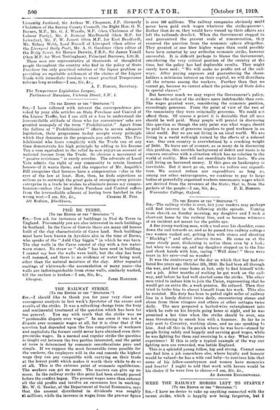THE RAILWAY STRIKE.
[To THE EDITOR OF THE " SPECTATOR."] EIR,—I should like to thank you for your very clear and courageous analysis in last week's Spectator of the causes and results of the strike. It was a refreshing change from the hazy and sentimental treatment of the question which has been far too general. You say with truth that the strike was no " pardonable dispute over wages." In one sense it was not a dispute over economic wages at all, for it is clear that if the question had depended upon the free competition of workmen and capitalists the former could never have obtained even their pre-strike wages. In a normal and regular strike the questioa is fought out between the two parties interested, and the point at issue ie determined by economic considerations pure and simple. If we suppose the most favourable issue possible for the workers, the employers will in the end concede the highest wage they can pay compatible with carrying on their trade at the lowest profit which makes it worth their while to do 53 at all. This is the extreme point of economic equilibrium. The workers can get no more. The masters can give up no more. In the railway strike this point had been already passed before the conflict began. The present wages more than exhaust all the old profits and involve an enormous loss in working. Mr. W. G. Towler, of the Department of Social Economics, says that the amount distributed in dividends was roughly 43 millions, while the increase in wages from the pre-war figure
is over 100 millions. The railway companies obviously could never have paid such wages whatever the strike-pressur Rather than do so, they would have wound up their affairs awl left the railroads derelict. When the Government stepped in and guaranteed the present scale of remuneration, tiny removed the question from the economic sphere altogether. They granted at one blow higher wages than could possibly have been extorted by any orthodox economic strike, however successful. It is difficult perhaps to blame the Government, considering the very critical position of the country at tha time, but the policy has had deplorable results. They might surely have said: " We will make no profits out of the railways. After paying expenses and guaranteeing the shareholders a minimum interest on their capital, we will distribute all the returns among the workers. Further than that we cannot go, because we cannot admit the principle of State doles to special classes."
But however much we may regret the Government's policy, it makes the action of the strikers more indefensible than ever. The wages granted were, considering the economic position, exceedingly generous. From the point of view of the rest of the community they were criminally generous. We could net afford them. Of course a priori it is desirable that all meet should be well paid. Many people will persist in discussing this question as though the only point was what wages should be paid by a man of generous impulses to good workmen in an ideal world. But we are not living in an ideal world. We are living in a world well-nigh ruined by the effects of a colossal war. Our own country is overwhelmed by a crushing weight of Debt. To leave out of account, as so many do in discussing this problem, this terrible background of deficit and waste is to concern ourselves with a situation which has no relation to the world of reality. Men will not co-ordinate their facts. We are still living on borrowed money. If this goes on bankruptcy is inevitable. But it must go on, unless we reduce our expenditure. We cannot reduce our expenditure as long as, among our other extravagances, we continue to pay to large bodies of powerfully organized workers uneconomic wages which are derived from the revenues of the State; that is, from the pockets of the people.—I am, Sir, &c., P. E. Ronees. Worcester College, Oxford.






































 Previous page
Previous page